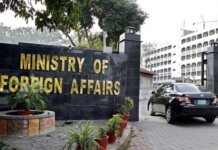Kabul, 25 January 2023 (TDI): The World Food Programme (WFP), has provided food to many Afghans, especially girls. On the International Day of Education, Afghan girls are facing hunger and inadequate opportunities for growth.
Food Insecurity
The school girls in Afghanistan are facing hunger. They attend school on empty stomach. An 11-year-old girl named Hazara talked about her issues.
She started her class in Chardahi village, in Afghanistan’s eastern Jalalabad province, on an empty stomach. She said, sometimes she has tea and a small portion of bread for breakfast.
Though most of the time she attends school without eating anything. She is a sixth-grade school girl and wears a headscarf and long robe, like her classmates.

She said that most of them remain hungry and it becomes difficult for her to concentrate on class lectures. Reprieve comes when teachers distribute a packet of WFP “High Energy Biscuits” to every student.
The school has enrolled about 1,000 students at this all-girl primary school. Along with this, one 100-gram roll of cookies packs in 450 calories, that contains fat, protein, and a raft of important vitamins and minerals that are essential for growing youngsters.
Hazra said, cookies are delicious, and eating them makes her happy because it gives them the energy to participate in class in a better way.
The biscuits are just part of WFP’s school feeding program. That has covered more than 900,000 Afghan students countrywide.
The support also offers a crucial buffer against soaring hunger, especially during these harsh winter months. School feeding is an important part of our activities in the country, said Hsiao-Wei Lee, WFP Country Director in Afghanistan.
Currently, Afghan girls and women are facing restrictions in pursuing education and work-related area. These restrictions have hit the hardest as the hunger crisis increased. The restrictions have halted the process to reach girls like Hazara.
Mona Shaikh, WFP’s Head of Nutrition in Afghanistan, said “A hungry child can’t learn well, because school feeding also enables parents to send their children to school, it offers a lifeline for girls especially, to get an education.”
Tangible Benefits in Difficult Times
The benefits of WFP’s school feeding are tangible in the Batikot district, where Chardahi village is located. In this area, school attendance become doubled, to more than 1,000 students. Since 2019, when WFP took initiative to provide take-home family rations.
These rations help to convince families to send girls to school, said the Director of one school. It also improves retention rates of the students, who get to stay in school for more years.

These provisions and the increase in student attendance have made powerful changes in the country that remained unstable and conflict-prone.
About nine out of 10 Afghans do not eat enough, and roughly two-thirds of the population accounted for 28.3 million people.
Since 2021, the Taliban has taken over the government’s only deepened crisis: droughts, floods, and climate shocks along with their poor policies.
Therefore, families are struggling in terms of livelihood, education, and opportunities. The climate shocks have created more food crises, especially the wheat crisis.
Education at A Crossroads
The education and economic opportunities for girls and women are sinking. Taliban have created havoc in the public life of girls and women. Girls can only attend the first six years of school and afterward, would be barred from secondary school.
In late 2022, the Taliban rulers forbade women from attending universities. Also, they have refrained from working for national and international nongovernmental organizations.
United Nations and its agencies also fall in this category. This move has affected the work of UN agencies and also deprived families of a different kind of relief.
WFP Continued its Work
The UN agencies and other humanitarian groups in Afghanistan have paused some activities because of the exclusion of women.

Although it has continued to distribute High-Energy Biscuits in community classes where female teachers are still teaching girls.
In a statement, WFP and other humanitarian agencies urged Afghan authorities, to reconsider their policy regarding the women’s aid worker ban.
The programme has been launched two decades ago in Afghanistan. That also included nutrition snacks made of local ingredients. The WFP’s school feeding programme in Afghanistan is supported by contributions from various institutions.
Such as the EU Commission’s Directorate-General for International Partnerships, the Government of France and the German Federal Ministry of Economic Cooperation and Development (BMZ), and the Republic of Korea.
Iqra is a research scholar. She writes on various platforms. She is the author of two books. Her research interest includes politics, International relations, diplomacy, peace, and conflict studies, public administration, sociology and history.








